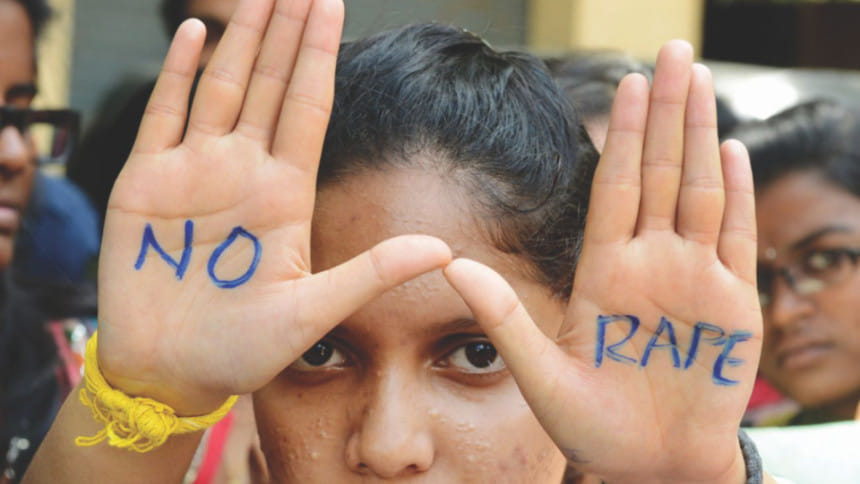Living in a rape culture

In Chicago, a 19-year-old university student has been held on bail on sexual assault charges for tying up, beating and raping a fellow college student. In Liberia, a 12 year-old girl was raped and killed. In Durban, South Africa, two Pakistani men have been accused of raping a domestic worker. In Turkey, a 20 year-old woman was murdered for attempting to resist rape. In Sweden, a 24 year-old man has been detained over an alleged gang rape. In the Democratic Republic of Congo, a 74 year-old Belgian man has been arrested for raping two girls. This is just a glimpse of the news in the past week and the list goes on...
Rape culture, a culture where sexual violence is the norm, is universal and most of its victims are women. Worldwide, one in three women have experienced physical or sexual violence in their lifetime and 50% of sexual assaults are committed against girls under the age of 16.
In the past few days, the news has been dominated by the documentary, India's Daughter, made by British filmmaker Leslee Udwin. The documentary was inspired by nationwide protests following the fatal gang rape and torture of a 23 year-old woman in New Delhi in 2012. India has banned the broadcast of the documentary in which one of the convicted rapists blames the victim for the crime and for resisting rape. Revoltingly enough, the unremorseful rapist even went as far as to say that women are more responsible than men for being raped.
BBC had originally planned to air the documentary on March 8, International Women's Day, but laudably ignored the ban and aired it Wednesday night. The point of contention in the ensuing controversy, as expressed by India's home minister, seems to be why the film crew was allowed access to a convicted felon on death row. NDTV reproduced letters as proof of Udwin obtaining permission from the home ministry to interview the convict. This course of action by the home minister and other like-minded government officials is simply reprehensible; the authorities, worried about India's 'image,' are attempting to sideline a much-needed national conversation about the deep-rooted, dangerously misogynistic attitudes prevalent in the Indian subcontinent.
Rape, a form of sexual violence, is about power and control; it is an aggressive act intended to degrade, dehumanise, torment and terrorise the victim. The hostility shown by the perpetrator threatens the victim's sense of self, and invades the victim's sense of privacy, safety and well-being. Rape culture, one of many ways in which sexual violence manifests itself, is perpetuated in societies that trivialise ("boys will be boys!") and rationalise ("she was wearing indecent clothes!") sexual violence. The media also plays a huge role in normalising and glamourising sexual violence by objectifying women's bodies and eroticising the physical abuse of women.
Often times, men accused of rape shift the responsibility of their wrongdoings on account of them acting on their inherent 'natural urges' triggered by exogenous conditions such as the victim's 'provocative' clothing, time of day, etc. Such widespread noxious attitudes that attempt to quantify a woman's worth, by reducing it to monetary value (dowry) or pieces of clothing (sign of 'good' or 'bad' character), are telling signs of how women are often viewed as sub-human. While perpetrators of sexual violence are entitled to their 'natural' desires, victims are constantly questioned about the veracity of their claims. In Bangladesh, the colonial era Evidence Act, 1872 still allows use of character evidence about complainants in rape trials; women who claim to have been raped have the burden of proof while men accused of such crimes are considered innocent until proven guilty. This is just another form of victim blaming in a culture that stigmatises and marginalises victims of rape who, at first stripped of physical power by the rapist, are then unwillingly trapped in the realm of pity and powerlessness by society at large.
Today, there is no sector in Bangladesh where women don't contribute. However, despite such tremendous gains, much of women's economic contributions remain unevaluated and unvalued. Manusher Jonno Foundation (MJF) reports that annually over Tk. 188 billion worth of work goes unreported; 95% of this sum is generated by women. Such blatant non-recognition of their work helps uphold stereotypes of women being a burden to their families, and prolong their lower status in society resulting in further discrimination and gender-based violence. The latter cannot be separated from the broader context of class oppression as poorer and less educated women are more prone to experience physical and sexual violence.
2.6 billion women live in 144 countries where rape in marriage is not a crime. The International Women's Development Agency (IWDA) is petitioning to take the matter to the UN in order to pressurise the government of these countries to draft laws that will criminalise marital rape to ensure women's safety in their own homes. The lack of such legal provisions is incomprehensible; if anything, it only goes to demonstrate the patriarchal attitudes that commodify and view women's bodies as property to be owned even in the institution of marriage.
Rape culture is also endorsed in everyday life when we normalise sexually explicit jokes that demean women, tolerate sexual harassment, participate in victim blaming, define 'manhood' as being dominant and 'womanhood' as being submissive, and teach women to avoid being raped instead of teaching men not to rape.
Rape myths also affect the ways in which a society deals with rape crimes. Prevailing myths are destructive because they tend to rationalise and justify such acts, making it tougher for rape victims to seek help and recover. Some of these pernicious myths are: women falsely report rape, rape is perpetrated by strangers, a man cannot rape his wife, and only certain 'types' of women are raped. Such misconceptions are detrimental and sickening.
Both men and women must recognise that the universal problem that is rape culture is not just a women's issue but also a men's issue, and that there is no 'single answer' to end rape culture. On an individual level, however, we can begin by unlearning stereotypes that perpetuate the objectification of and enable violence towards women's bodies. The onus lies within each and every one of us to reverse such reprehensible sexist attitudes through which women are persistently put under a dehumanising patriarchal microscope that constantly scrutinises every aspect of women's lives.
The writer is a graduate of University of California, Los Angeles.

 For all latest news, follow The Daily Star's Google News channel.
For all latest news, follow The Daily Star's Google News channel. 



Comments